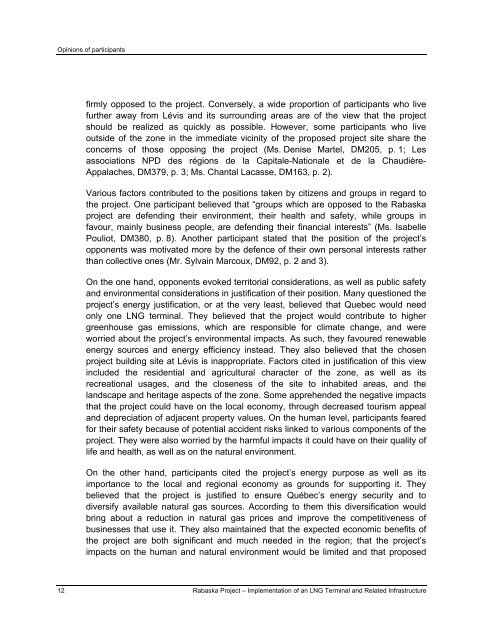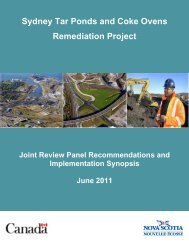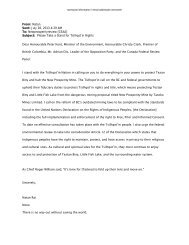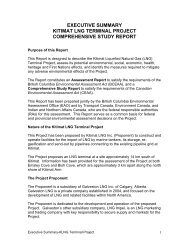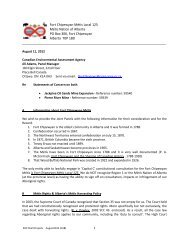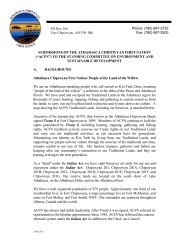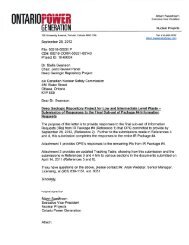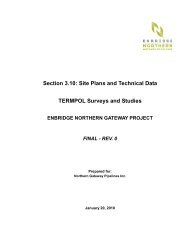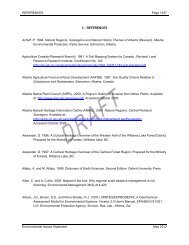Report - Agence canadienne d'évaluation environnementale
Report - Agence canadienne d'évaluation environnementale
Report - Agence canadienne d'évaluation environnementale
Create successful ePaper yourself
Turn your PDF publications into a flip-book with our unique Google optimized e-Paper software.
Opinions of participants<br />
firmly opposed to the project. Conversely, a wide proportion of participants who live<br />
further away from Lévis and its surrounding areas are of the view that the project<br />
should be realized as quickly as possible. However, some participants who live<br />
outside of the zone in the immediate vicinity of the proposed project site share the<br />
concerns of those opposing the project (Ms. Denise Martel, DM205, p. 1; Les<br />
associations NPD des régions de la Capitale-Nationale et de la Chaudière-<br />
Appalaches, DM379, p. 3; Ms. Chantal Lacasse, DM163, p. 2).<br />
Various factors contributed to the positions taken by citizens and groups in regard to<br />
the project. One participant believed that “groups which are opposed to the Rabaska<br />
project are defending their environment, their health and safety, while groups in<br />
favour, mainly business people, are defending their financial interests” (Ms. Isabelle<br />
Pouliot, DM380, p. 8). Another participant stated that the position of the project’s<br />
opponents was motivated more by the defence of their own personal interests rather<br />
than collective ones (Mr. Sylvain Marcoux, DM92, p. 2 and 3).<br />
On the one hand, opponents evoked territorial considerations, as well as public safety<br />
and environmental considerations in justification of their position. Many questioned the<br />
project’s energy justification, or at the very least, believed that Quebec would need<br />
only one LNG terminal. They believed that the project would contribute to higher<br />
greenhouse gas emissions, which are responsible for climate change, and were<br />
worried about the project’s environmental impacts. As such, they favoured renewable<br />
energy sources and energy efficiency instead. They also believed that the chosen<br />
project building site at Lévis is inappropriate. Factors cited in justification of this view<br />
included the residential and agricultural character of the zone, as well as its<br />
recreational usages, and the closeness of the site to inhabited areas, and the<br />
landscape and heritage aspects of the zone. Some apprehended the negative impacts<br />
that the project could have on the local economy, through decreased tourism appeal<br />
and depreciation of adjacent property values. On the human level, participants feared<br />
for their safety because of potential accident risks linked to various components of the<br />
project. They were also worried by the harmful impacts it could have on their quality of<br />
life and health, as well as on the natural environment.<br />
On the other hand, participants cited the project’s energy purpose as well as its<br />
importance to the local and regional economy as grounds for supporting it. They<br />
believed that the project is justified to ensure Québec’s energy security and to<br />
diversify available natural gas sources. According to them this diversification would<br />
bring about a reduction in natural gas prices and improve the competitiveness of<br />
businesses that use it. They also maintained that the expected economic benefits of<br />
the project are both significant and much needed in the region; that the project’s<br />
impacts on the human and natural environment would be limited and that proposed<br />
12 Rabaska Project – Implementation of an LNG Terminal and Related Infrastructure


